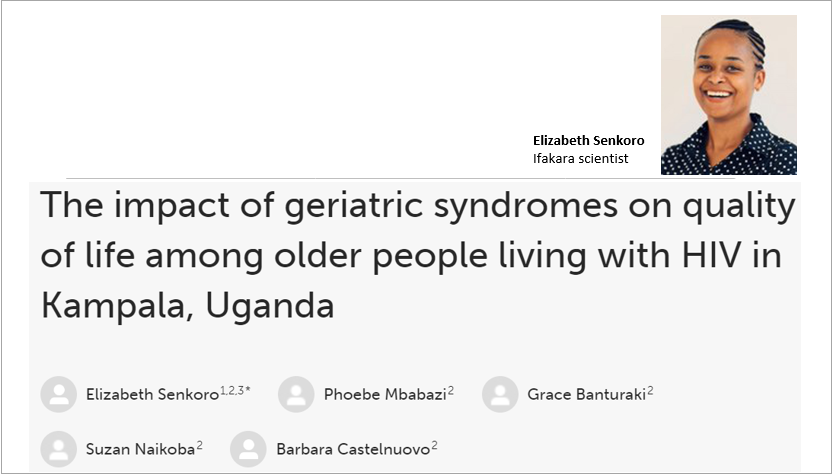
HIV: Enhancing the quality of life for older people with the virus

Comprehensive care that goes beyond virus suppression has been underscored in a recent study involving older individuals with HIV in Kampala, Uganda. The research looked at how different factors, such as socio-demographic, clinical, and aging-related issues (geriatric syndromes), influence the Quality of Life (QoL) of Older People with HIV (OPWH).
Challenges faced by OPWH
It is commonly known that having a good QoL is a key component of healthy aging, however, OPWH are at risk of experiencing poor QoL compared to younger PLWH and compared to older people without HIV.
This vulnerability is attributed to factors such as multi-morbidity, poly-pharmacy, and the prevalence of geriatric syndromes, including frailty, cognitive impairment, falls, and reduced physical function.
Study observes positive QOL in participants
Despite these challenges, the study which was collaboratively conducted by scientists from Ifakara Health Institute, Makerere University and the International AIDS Society (IAS), revealed a generally positive quality of life among the 500 participants enrolled in the study, the majority of whom were aged 60 years and older.
As reported in the study which has been published in the Frontiers journal, the scientists attributed the overall positive QoL observed in participants to the comprehensive HIV care programs offered in Uganda.
They wrote, “In our cohort, we found an overall good QoL among our participants which might have been influenced by the availability of comprehensive HIV programs that offer primary care services. In addition, participants were recruited from a well-established senior citizen clinic integrated within the Infectious Disease Clinic where they receive regular HIV monitoring and management.”
Carried out within a specialized senior citizen clinic, the study involved individuals with well-managed HIV. Participants were recruited from the Adult HIV Clinic of the Infectious Diseases Institute (IDI) in Kampala, Uganda, a center of excellence in HIV care and treatment since 2004.
The assessment period spanned from December 2020 to December 2021, during which participants underwent screening and annual follow-ups conducted by a nurse under the supervision of a physician responsible for routine care.
NCDs impact on OPWH
All participants involved in the year-long study had at least one Non-Communicable Disease (NCD) and two issues related to aging, which surprisingly led to increased QoL in certain aspects. Scientists attribute this unexpected outcome to the possibility of receiving specialized care and proactive health-seeking behavior among those with multiple conditions.
They also recommended further investigation, stating, "This odd result suggests a potential influence of specialized clinic care, frequent visits, and proactive healthcare-seeking behavior among OPWH with co-morbidities in our setting, warranting further exploration.”
Sociodemographic factors explored
Certain sociodemographic factors such as being male and having a daily income of $1 or more positively also influenced QoL, particularly in “autonomy” and “intimacy” domains noted the scientists.
“This observation may be attributable to gender differences in cultural and social norms, access to healthcare, jobs and coping strategies in our society. Financial stability may allow access to healthcare, nutritious food, social relations and other factors that contribute to the well-being of this population,” they wrote in their paper.
Geriatric syndromes impact on OPWH
The study also explored geriatric syndromes such as memory decline, weakness, falls, urine incontinence, and low physical function, highlighting how these factors independently contributed to decreased QoL.
Additionally, the study revealed that pre-frailty, frailty, malnourishment, depressive symptoms, and low to moderate physical function individually contributed to a decrease in the overall QoL for OPWH.
Although these factors are interrelated, often co-occurred and manifest bi-directional influences, the scientists observed that with the occurrence of each additional geriatric syndrome, there was a corresponding decline in QoL.
“For instance, malnutrition can substantially contribute to the emergence and progression of frailty and reduced physical function, especially among older adults. Reduced physical function in OPWH may lead to reduced mobility and physical activity, limiting their ability to engage in daily tasks and activities. This can result in a decreased sense of independence and an overall decrease in their QoL.”
Recommendations for improved QOL
As persons with HIV live longer, the study emphasizes the need to integrate screening and management of geriatric syndromes into routine HIV care. This integration has the potential to positively impact the overall quality of life for those with HIV-related health concerns (OPWH).
The scientists are certain that assessing geriatric syndromes can enable timely interventions, such as modifying diets, providing nutritional supplements, and implementing targeted exercise programs, which can significantly enhance the QoL of OPWH.
Furthermore, the scientists recommend tailored approaches that consider local socio-economic and healthcare contexts. They propose exploring the feasibility of integrating geriatric care into HIV clinics, especially in resource-limited settings. Additionally, they emphasize the importance of acknowledging demographic variables, such as gender and income levels, to ensure equitable support for OPWH.
Ifakara scientist is lead author
The study was led by Ifakara scientist Elizabeth Senkoro who is also affiliated with Mark Wainberg Fellowship Program under the International AIDS Society (IAS) and Makerere University. Senkoro worked in collaboration with Phoebe Mbabazi, Grace Banturaki, Suzan Naikoba and Barbara Castelnuovo from Makerere University.
Read the full publication here.
